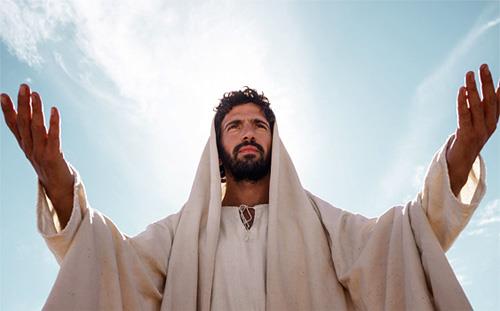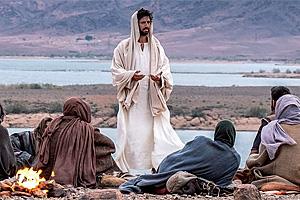
The Greatest Story Ever Told some time ago became the most popular story ever retold, and now here’s History back to have another go at the life of Jesus Christ.
Jesus: His Life premieres Sunday at 8 p.m. ET on History and will run eight episodes, two each Sunday night through Easter weekend.
While practitioners of other religions may have their own views on what constitutes a great ode to faith, it’s hard to dispute that Jesus’s relatively short life generated exceptional drama.
This new docudrama takes a calm, steady tone, tracing Jesus’s life in strict chronological order and dropping in Bible scholars and clergypersons to explain the ongoing historical context.
If this were strictly a religious narrative, these pauses would slow the story down, because they often carry cautions. Conventional wisdom and even conventional belief, it seems, are sometimes not entirely consistent with historical information.
The first episode, for instance, has the actors who play Jesus’s mother and father, Mary and Joseph, taking their long pilgrimage to Bethlehem because Roman King Herod had ordered a census for purposes of imposing taxes.
 This narrative has come down to us primarily from the gospel of Luke. Scholars here note, however, that other contemporary records suggest Herod did not order a census until a decade after Jesus’s birth.
This narrative has come down to us primarily from the gospel of Luke. Scholars here note, however, that other contemporary records suggest Herod did not order a census until a decade after Jesus’s birth.
Likewise, Jesus: His Life dramatizes the familiar story that once Herod heard of Jesus’s birth, and the subsequent belief among many Jews that Jesus was the Messiah, the jealous king ordered the slaughter of all children under the age of 2 in Bethlehem.
Scholars note there is no independent confirmation this occurred. Which leads several ministers to respond that since Herod perpetrated equally appalling atrocities at other times, there’s no reason to believe he couldn’t have ordered this one, too.
A smaller but equally fascinating subplot of the Herod story has Joseph rebuking the Magi, the “three wise men” who famously visited Jesus and brought Him gifts, for telling Herod about their pilgrimage before they left.
This put Jesus’s life in danger, Joseph tells them, suggesting that under the circumstances, the visit of the Magi was unwelcome.
Scholars also note that the gospel of Matthew, which tells the story of the Magi, does not specify that there were three of them, or whether they arrived any time near Jesus’s birth. However immortalized that image has become on Christmas cards, we are told, it may or may not be a true representation.
And speaking of Christmas card images, the manger thing also may be mildly misleading. When Joseph and Mary arrived in Bethlehem, they went to the home of friends who it turned out already had guests. So Joseph and Mary stayed on the first floor of the house – where, it is true, the animals also were kept.
All this said, Jesus: His Life nowhere challenges the central tenets of the Christian story, or pokes holes in anyone’s faith. It simply notes that many details of a story that happened more than 2,000 years ago, at a time when there was no systematic recording media, sometimes must be extrapolated from what we do know.
So while scholars insert frequent caveats, Jesus is treated with as much reverence here as He is in most of the churches that worship Him.
In the first episode, that reverence extends to his father. Scholars note that in the Judea of Joseph’s time, it would have been extremely unusual for a man to accept that his wife-to-be was pregnant through immaculate conception.
Okay, that would be extremely unusual in any time period. The stakes were higher in Judea because had anyone suspected Mary’s pregnancy resulted from relations with anyone other than her husband, she could have been executed.
Jesus: His Lifetakes us to that Judea and walks us through the daily lives of people like Joseph and Mary, just as subsequent episodes will take us into the worlds of other central figures in Jesus’s life, like the apostles.
The drama focuses on the lives that led to the legacies, and while docudrama re-creations can feel stilted, it’s still a story worth retelling.